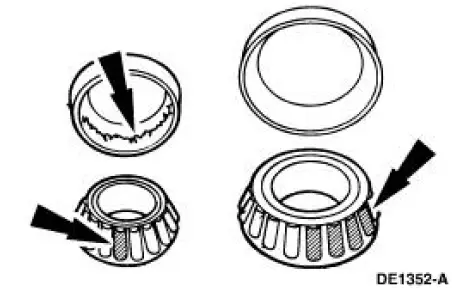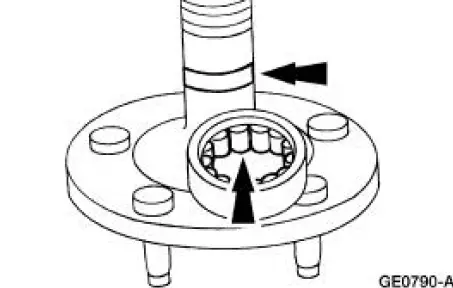Ford Mustang (1999-2004) Service Manual: Bearing Whine
Bearing whine is a high-pitched sound similar to a whistle. It is usually caused by worn/damaged pinion bearings, which are operating at driveshaft speed. Bearing noise occurs at all driving speeds.
This distinguishes it from gear whine which usually comes and goes as speed changes.
As noted, pinion bearings make a high-pitched, whistling noise, usually at all speeds. If however there is only one pinion bearing that is worn/damaged, the noise may vary in different driving phases. If pinion bearings are scored or damaged or there is a specific pinion bearing noise, new pinion bearings must be installed. A worn/damaged bearing will normally be obvious at disassembly. Examine the large end of the rollers for wear. If the pinion bearings original blend radius has worn to a sharp edge, a new pinion bearing must be installed.
NOTE: A low-pitched rumble normally associated with a worn/damaged wheel bearing can also be caused by tires.
A wheel bearing noise can be mistaken for a pinion bearing noise. Check the wheel bearing for a spalled cup, and spalled/damaged rollers. Check the wheel bearing for rotating smoothness and end play. Install a new wheel bearing if any of these concerns are detected.

If the wheel bearing is damaged, the roller surface on the axle shaft may also be damaged. Install a new axle shaft if any damage is detected.

 Gear Howl and Whine
Gear Howl and Whine
Howling or whining of the ring gear and pinion is due to an incorrect gear
pattern, gear damage or
incorrect bearing preload. ...
 Chuckle
Chuckle
Chuckle that occurs on the coast driving phase is usually caused by excessive
clearance between the
differential gear hub and the differential case bore.
Damage to a gear tooth on the coast side can ...
Other materials:
Rear View Mirrors
Torque Specifications
Rear View Mirrors
The rear view mirror system consists of the following components:
exterior rear view mirror
exterior rear view mirror control
exterior rear view mirror glass
exterior rear view mirror motor
interior ...
Transmission Drive Cycle Test
NOTE: Always drive the vehicle in a safe manner according to driving
conditions and obey all traffic
laws.
NOTE: The Transmission Drive Cycle Test must be followed exactly.
Malfunctions must occur four
times consecutively for shift error DTC code to be set, ...
Front Bumper Cover
Removal and Installation
NOTE: Mustang shown, GT and Cobra similar.
1. Remove the pin-type retainers and the radiator upper sight shield.
2. Remove the two pin-type retainers (one each side).
3. Remove the four front bumper cover nuts (two each side).
4. ...
